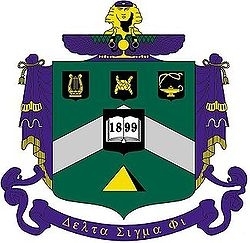 |
| Delta Sigma Phi (Wikipedia (Delta Sigma Phi)) |
On January 21, 1918, Richard and Edith Winters gave birth to a son. That son is Richard Dick Winters. Richard spent most of his younger years in Ephrata, Pennsylvania, the town he was born in. At 8 years old his family moved to Lancaster, a nearby town, and stayed there for the rest of his youth and teenage years, until he matriculated to Franklin and Marshall College in 1937. There he became part of Delta Sigma Phi, a fraternity, and played football and basketball as a member of the Upsilon Chapter. Sadly, he had to give up wrestling, his favorite sport, and all of his part time jobs that paid for his college experience. He ended up graduating in 1941 with the highest academic standing in business college. War had just erupted in Europe at the time, so Richard decided it was a good choice to enlist in the army.
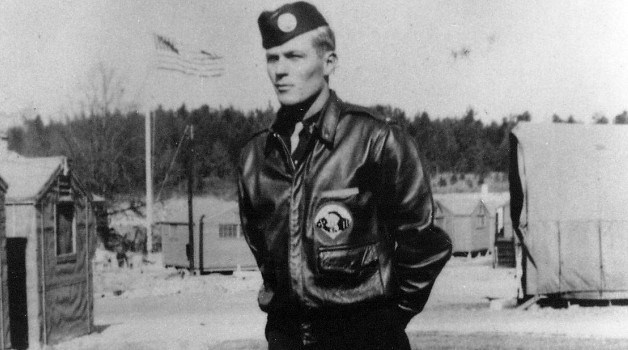 |
Richard Winters officially enlisted in the armed forces on August 25, 1941, in order to shorten his time in service. Back then all men between the ages of 18 and 45 were subject to military service, and lots of drafting was going on. In early September he went through basic training at Camp Croft in South Carolina. Winters stayed after completing his training to help out and train the new draftees and volunteers., while the rest of his battalion was deployed to Panama. In April of 1942, he was selected to attend Officer Candidate School at Fort Benning, Georgia. It was there that he met Lewis Nixon, a future friend and companion during the war. Later, Richard was promoted to second lieutenant after graduating on July 2, 1942. He had reached the decision that he wanted to join the parachute infantry, and 5 weeks later, Winters was commissioned to join the 506th Parachute Infantry Regiment at Camp Toccoa in Georgia.
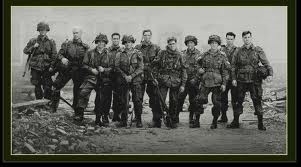 |
| Easy Company (heavylifting.blogspot.com (US ARMY)) |
He arrived in August of 1942 and was immediately assigned to Company E (or commonly known as Easy company), 2nd Battalion, 506th PIR, serving under First Lieutenant Herbert Sobel. Assigned as platoon leader, Winters did a remarkable job, and was promoted to executive officer in 1943. Little did he know that the 506th PIR was an experimental unit, and was the first of its kind to undertake airborne training as a whole. Training was very tough, even for Richard, and out of the 500 that had volunteered, only 148 made it. On June 10, 1943, the 506th PIR was officially bounded to the 101 Airborne Division, and were sent to England to take an intense training program intended to prepare them for the impending invasion of Europe in 1944.
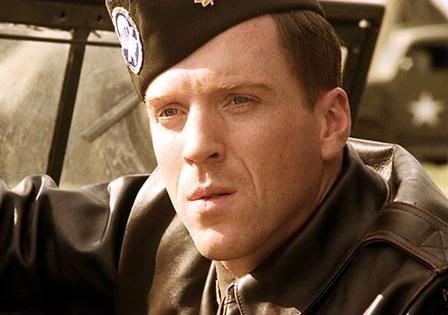 |
| bob.wikia.com (Band of Brothers Show/Movie) |
The Tension between Sobel and Winters was growing over time, with the both of them questioning each others leadership skills. Many of the enlisted men respected and had come to be good friends with Winters; they to had come to the conclusion that Sobels leadership was questionable. Although Winters stated that he, "never wanted to compete with Sobel for command of Easy Company." But the situation got out of hand when Sobel brought charges up on Richard for failure to complete a "lawful order". Feeling his punishment was, "unjust", Winters "requested the charges be tried by court martial." But when the Battalion Commander ignored Sobels charges, Sobel decided to charge Richard a second time. While the investigation was being undertaken, Winters was appointed to Battalion Mess Officer. A number of NCO's (Non Commissioned Officers) that were under the command of Winters stated, "Either Sobel be replaced, or we will hand back our stripes." They were immediately demoted. Colonel Robert Sink, the man in charge, realized something had to be done, so Sobel was transferred. Richard Winters charges were set aside and he shortly returned as platoon leader, with the new Thomas III as commander of Easy company. Meehand
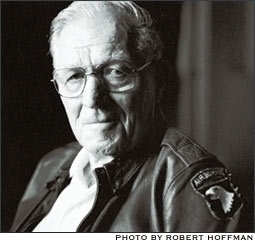 |
| Richard Winters 2011 (101stairbornedivision.webnode.cz (US ARMY)) |
During the Normandy invasion, Winters states that a few of the planes containing Easy company were, "shot down by German anti-aircraft fire, killing everyone on board." Richard managed to land safely near Sainte-Mère-Église, but in the process, lose his weapon and supplies. He then rallied all of his remaining soldiers and proceeded toward his objective. Sadly, Lieutenant Meehan was killed during the plane explosion, so Winters was put in control of the Company. Later the same day, Richard led an offensive that, "destroyed a battery of German 105 mm howitzers which were firing onto the causeways that served as the principal exits from Utah Beach." He and his troops were victorious, and even managed to get a map of all of the guns aligning Utah Beach, which probably saved thousands of lives! On July 1st, 1944, Richard Dick Winters was promoted to captain, officially made commander of Easy Company, and received the Distinguished Service Cross from General Omar N. Bradley. On October 5th, 1944, Winters participated in the battle of Market Garden. It was suicide. Most of his men were wounded and they were being constantly flanked by the Germans. "Realizing the seriousness of the situation, I took one squad from 1st Platoon, and moved off toward the crossroads, where we observed a German machine gun firing to the south, toward the battalion headquarters. After surveying the position, I then led the squad in an assault on the gun crew. Soon after taking the position, the squad took fire from a German position opposite them. Estimating that this position was held by at least a platoon, I called for reinforcements from the rest of the 1st Platoon, and led them in an assault. Later it was discovered there were at least 300 Germans." Winters also helped in the defense of northeast Bastogne near the town of Foy during what became known as the Battle of the Bulge. After all of this, Winters was promoted to major, then commander. Many soldiers were recommending him for the Medal of Honor, but it was limited to only 1 per platoon, and it was already given to Robert G. Cole. Even today people are recommending him. Representative Tim Holden introduced HR 3121 "To authorize and request the President to award the Medal of Honor to Richard D. Winters, of Hershey, Pennsylvania, for acts of valor on June 6, 1944, in Normandy, France, while an officer in the 101st Airborne Division." Nothing has been done yet.
Richard later served part time in the Korean war, but not in combat. Afterwords, he moved back to his hometown to work for his old friend Lewis Nixon. Richard Winters retired in 1997, but died at the age of 93 on January 2nd, 2011, suffering from Parkinson's Disease. May he rest in peace forever.
To me a hero must have courage, bravery, passion, luck, dedication, valor, conviction, and selflessness. Richard Winters showed all of these throughout his lifetime from Pennsylvania to Camp Croft, defiantly through Normandy and Bastogne, Korea, and pretty much everywhere he went. Winters has inspired me to help others in need, as he did in Normandy when he rescued all of his soldiers.
Page created on 11/2/2012 12:00:00 AM
Last edited 11/2/2012 12:00:00 AM
